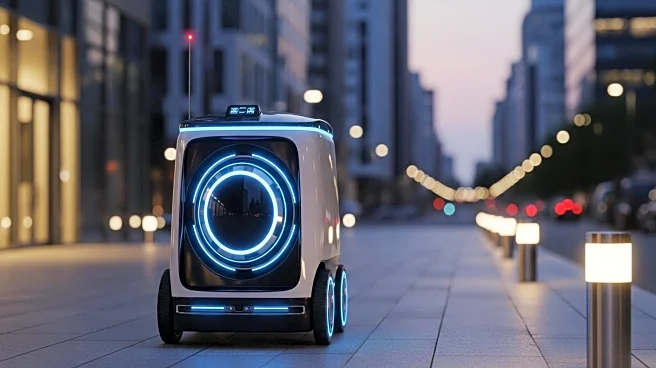What's Happening?
DoorDash has introduced Dot, its first autonomous delivery robot designed to navigate bike lanes, roads, sidewalks, and driveways for local deliveries. Dot is engineered to be compact, at one-tenth the size of a car, and can travel up to 20 mph, making it suitable for neighborhood trips. The robot is intended to help local businesses meet increasing consumer demand by providing efficient delivery services. Stanley Tang, co-founder and head of DoorDash Labs, emphasized Dot's reliability and efficiency in serving the needs of local businesses and consumers. Dot is equipped with a perception stack that includes eight external cameras for 360-degree coverage, radar units, and lidar sensors for situational awareness. The robot's design allows it to carry up to 30 pounds of cargo, including six large pizza boxes, and is small enough to fit through most doors. DoorDash plans to deploy Dot initially in Tempe and Mesa, Arizona, as part of its early-access program, with future expansions into multiple markets.
Why It's Important?
The introduction of Dot represents a significant advancement in autonomous delivery technology, potentially transforming the logistics and delivery industry. By reducing reliance on full-sized vehicles for small deliveries, Dot could decrease traffic congestion and improve delivery efficiency for local businesses. This innovation aligns with the growing demand for faster and more reliable delivery services, particularly in urban and suburban areas. DoorDash's investment in autonomous technology highlights the company's commitment to enhancing its delivery platform and maintaining competitiveness in the market. The deployment of Dot could also influence other companies in the delivery sector to adopt similar technologies, fostering innovation and potentially leading to broader acceptance of autonomous delivery solutions.
What's Next?
DoorDash plans to expand Dot's deployment beyond Arizona, potentially reaching multiple markets as the technology proves successful. The company will continue to refine Dot's capabilities, focusing on optimizing its autonomous delivery platform to better orchestrate deliveries. This includes determining the most efficient delivery method, whether through human dashers, drones, or robots like Dot. As DoorDash collaborates with partners such as Wing and Coco Robotics, the company aims to enhance its delivery services and explore new opportunities for autonomous delivery solutions. The success of Dot's initial deployment could pave the way for further advancements in autonomous delivery technology and its integration into everyday logistics.
Beyond the Headlines
The development of Dot raises important considerations regarding the future of urban mobility and the role of autonomous technology in everyday life. Ethical and legal dimensions, such as safety regulations and the impact on employment in the delivery sector, will need to be addressed as autonomous delivery robots become more prevalent. Additionally, the cultural acceptance of robots interacting with humans in public spaces will play a crucial role in the widespread adoption of such technologies. Long-term shifts in consumer behavior and business operations could be triggered by the successful implementation of autonomous delivery solutions like Dot.









